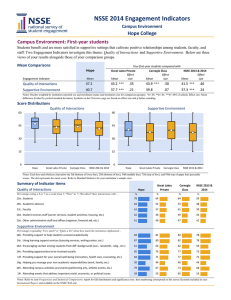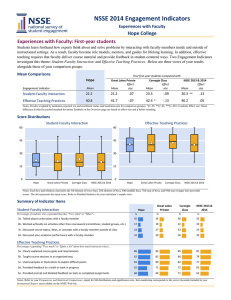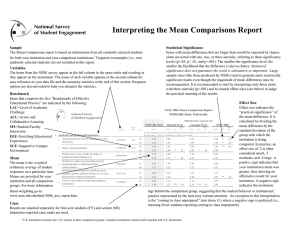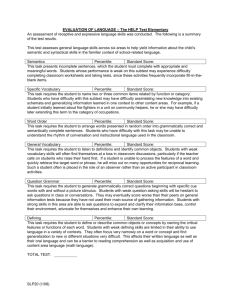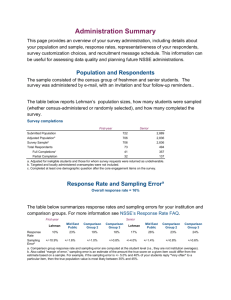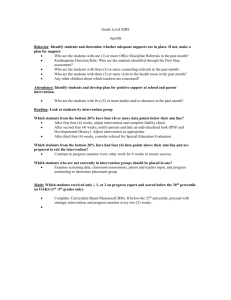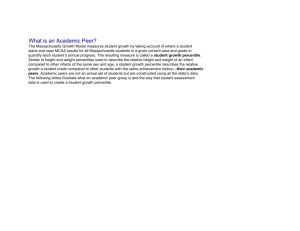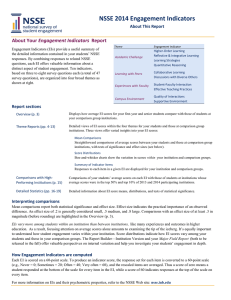NSSE 2014 Engagement Indicators Learning with Peers: First-year students Hope College
advertisement
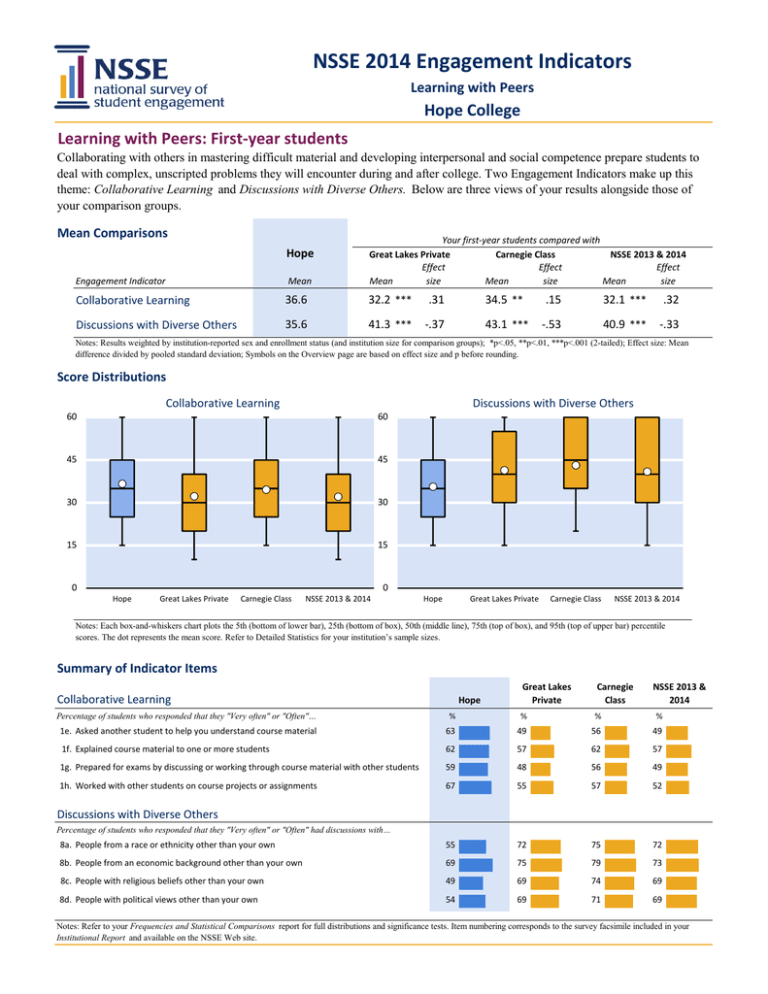
NSSE 2014 Engagement Indicators Learning with Peers Hope College Learning with Peers: First-year students Collaborating with others in mastering difficult material and developing interpersonal and social competence prepare students to deal with complex, unscripted problems they will encounter during and after college. Two Engagement Indicators make up this theme: Collaborative Learning and Discussions with Diverse Others. Below are three views of your results alongside those of your comparison groups. Mean Comparisons Engagement Indicator Mean Your first-year students compared with Great Lakes Private Carnegie Class NSSE 2013 & 2014 Effect Effect Effect Mean size Mean size Mean size Collaborative Learning 36.6 32.2 *** .31 34.5 ** .15 32.1 *** .32 Discussions with Diverse Others 35.6 41.3 *** -.37 43.1 *** -.53 40.9 *** -.33 Hope Notes: Results weighted by institution-reported sex and enrollment status (and institution size for comparison groups); *p<.05, **p<.01, ***p<.001 (2-tailed); Effect size: Mean difference divided by pooled standard deviation; Symbols on the Overview page are based on effect size and p before rounding. Score Distributions Collaborative Learning 60 Discussions with Diverse Others 60 45 45 30 30 15 15 0 0 Hope Great Lakes Private Carnegie Class NSSE 2013 & 2014 Hope Great Lakes Private Carnegie Class NSSE 2013 & 2014 Notes: Each box-and-whiskers chart plots the 5th (bottom of lower bar), 25th (bottom of box), 50th (middle line), 75th (top of box), and 95th (top of upper bar) percentile scores. The dot represents the mean score. Refer to Detailed Statistics for your institution’s sample sizes. Summary of Indicator Items Collaborative Learning Hope Great Lakes Private Carnegie Class NSSE 2013 & 2014 Percentage of students who responded that they "Very often" or "Often"… % % % % 1e. Asked another student to help you understand course material 63 49 56 49 1f. Explained course material to one or more students 62 57 62 57 1g. Prepared for exams by discussing or working through course material with other students 59 48 56 49 1h. Worked with other students on course projects or assignments 67 55 57 52 8a. People from a race or ethnicity other than your own 55 72 75 72 8b. People from an economic background other than your own 69 75 79 73 8c. People with religious beliefs other than your own 49 69 74 69 8d. People with political views other than your own 54 69 71 69 Discussions with Diverse Others Percentage of students who responded that they "Very often" or "Often" had discussions with… Notes: Refer to your Frequencies and Statistical Comparisons report for full distributions and significance tests. Item numbering corresponds to the survey facsimile included in your Institutional Report and available on the NSSE Web site. NSSE 2014 Engagement Indicators Learning with Peers Hope College Learning with Peers: Seniors Collaborating with others in mastering difficult material and developing interpersonal and social competence prepare students to deal with complex, unscripted problems they will encounter during and after college. Two Engagement Indicators make up this theme: Collaborative Learning and Discussions with Diverse Others. Below are three views of your results alongside those of your comparison groups. Mean Comparisons Hope Engagement Indicator Mean Great Lakes Private Effect Mean size Collaborative Learning 35.6 32.9 ** .20 Discussions with Diverse Others 35.5 41.8 *** -.42 Your seniors compared with Carnegie Class Effect Mean size 35.0 42.2 *** NSSE 2013 & 2014 Effect Mean size .05 32.4 *** .22 -.46 41.8 *** -.39 Notes: Results weighted by institution-reported sex and enrollment status (and institution size for comparison groups); *p<.05, **p<.01, ***p<.001 (2-tailed); Effect size: Mean difference divided by pooled standard deviation; Symbols on the Overview page are based on effect size and p before rounding. Score Distributions Collaborative Learning Discussions with Diverse Others 60 60 45 45 30 30 15 15 0 0 Hope Great Lakes Private Carnegie Class NSSE 2013 & 2014 Hope Great Lakes Private Carnegie Class NSSE 2013 & 2014 Notes: Each box-and-whiskers chart plots the 5th (bottom of lower bar), 25th (bottom of box), 50th (middle line), 75th (top of box), and 95th (top of upper bar) percentile scores. The dot represents the mean score. Refer to Detailed Statistics for your institution’s sample sizes. Summary of Indicator Items Collaborative Learning Hope Great Lakes Private Carnegie Class NSSE 2013 & 2014 Percentage of students who responded that they "Very often" or "Often"… % % % % 1e. Asked another student to help you understand course material 54 41 47 40 1f. Explained course material to one or more students 67 60 66 58 1g. Prepared for exams by discussing or working through course material with other students 56 46 54 46 1h. Worked with other students on course projects or assignments 68 66 66 64 8a. People from a race or ethnicity other than your own 51 72 71 73 8b. People from an economic background other than your own 62 75 77 75 8c. People with religious beliefs other than your own 51 69 72 70 8d. People with political views other than your own 67 72 69 71 Discussions with Diverse Others Percentage of students who responded that they "Very often" or "Often" had discussions with… Notes: Refer to your Frequencies and Statistical Comparisons report for full distributions and significance tests. Item numbering corresponds to the survey facsimile included in your Institutional Report and available on the NSSE Web site. 2 • NSSE 2014 ENGAGEMENT INDICATORS Hope College 2014 Engagement Indicators Collaborative Learning 60% Hope Mean Percentile of Group Mean Distribution 99.6% 40% 20% 0% SD 13.5 14.1 100% Group Mean Standard Deviations of Hope Mean from Group Mean 5.64 60% Hope Mean Percentile of Group Mean Distribution 100.0% 100.0% 80% 0.0% 40% 0% SD 13.5 13.7 100% Group Mean Standard Deviations of Hope Mean from Group Mean 2.44 60% Hope Mean Percentile of Group Mean Distribution 99.3% Collaborative Learning Top 10% Detailed Statistics: First-Year Students SD 13.5 13.6 100% Group Mean Standard Deviations of Hope Mean from Group Mean -0.56 60% Mean 36.6 37.0 Hope Mean Percentile of Group Mean Distribution 28.9% 28.9% 80% 71.1% 40% 20% 0% Prepared by Hope College Office of Institutional Research 2/24/2015 28.9% Hope Group Mean 35.6 32.4 20% 0% 100% Group Mean Standard Deviations of Hope Mean from Group Mean 3.56 60% 80% 40% 100.0% 0.0% 20% 0% Collaborative Learning Top 50% Detailed Statistics: Seniors Mean 35.6 35.4 SD 13.4 13.8 100% Group Mean Standard Deviations of Hope Mean from Group Mean 0.30 60% Hope Mean Percentile of Group Mean Distribution 61.9% 0% 40% SD 13.4 14.6 Hope Group 20% 77.0% 80% 23.0% Collaborative Learning NSSE 2013 & 2014 Detailed Statistics: Seniors SNSUM # 3 99.3% 80% 0.7% 40% 60% Hope Mean Percentile of Group Mean Distribution 100.0% 99.3% Mean 36.6 34.7 Group Mean Standard Deviations of Hope Mean from Group Mean 0.74 Hope Group 20% Collaborative Learning Top 50% Detailed Statistics: First-Year Students Hope Group 100% SNSUM # 2 100.0% Mean 36.6 32.1 Mean 35.6 35.0 Hope Mean Percentile of Group Mean Distribution 77.0% Collaborative Learning NSSE 2013 & 2014 Detailed Statistics: First-Year Students Hope Group SD 13.4 13.7 Hope Group 77.0% Group Mean Standard Deviations of Hope Mean from Group Mean 2.67 99.6% 80% 0.4% 100.0% 100% 99.6% Mean 36.6 34.5 Collaborative Learning Carnegie Class Detailed Statistics: Seniors SNSUM # 4 61.9% 80% 38.1% 40% 20% 61.9% SD 13.5 13.4 Hope Group SNSUM # 1 0% Collaborative Learning Top 10% Detailed Statistics: Seniors SD 13.4 13.6 100% Group Mean Standard Deviations of Hope Mean from Group Mean -2.45 60% Hope Group Mean 35.6 37.7 Hope Mean Percentile of Group Mean Distribution 0.7% 0.7% 80% 99.3% 40% 20% 0% 0.7% Collaborative Learning Carnegie Class Detailed Statistics: First-Year Students Hope College 2014 Engagement Indicators Discussions with Diverse Others 60% Hope Mean Percentile of Group Mean Distribution 0.0% 40% 20% 0% Discussions with Diverse Others NSSE 2013 & 2014 Detailed Statistics: First-Year Students SD 14.0 16.0 100% Group Mean Standard Deviations of Hope Mean from Group Mean -5.63 60% Mean 35.6 40.9 Hope Mean Percentile of Group Mean Distribution 0.0% 20% SD 14.0 15.4 100% Group Mean Standard Deviations of Hope Mean from Group Mean -8.42 60% Mean 35.6 43.2 Hope Mean Percentile of Group Mean Distribution 0.0% 20% Discussions with Diverse Others Top 10% Detailed Statistics: First-Year Students SD 14.0 14.8 100% Group Mean Standard Deviations of Hope Mean from Group Mean -11.46 60% Mean 35.6 45.6 Hope Mean Percentile of Group Mean Distribution 0.0% 0.0% 80% 100.0% 40% 20% 0% Prepared by Hope College Office of Institutional Research 2/24/2015 0.0% Hope Group 40% 20% 0% SD 12.6 16.1 100% Group Mean Standard Deviations of Hope Mean from Group Mean -6.11 60% Mean 35.5 41.8 0.0% 80% 100.0% 40% 20% 0% Discussions with Diverse Others Top 50% Detailed Statistics: Seniors SD 12.6 15.8 100% Group Mean Standard Deviations of Hope Mean from Group Mean -8.28 60% Hope Group 40% 0.0% 80% 100.0% Discussions with Diverse Others NSSE 2013 & 2014 Detailed Statistics: Seniors SNSUM # 3 0.0% 80% 100.0% 0% 60% Hope Mean Percentile of Group Mean Distribution 0.0% Mean 35.5 43.9 Hope Mean Percentile of Group Mean Distribution 0.0% 0.0% Hope Group Group Mean Standard Deviations of Hope Mean from Group Mean -7.05 Hope Group 40% Discussions with Diverse Others Top 50% Detailed Statistics: First-Year Students 100% SNSUM # 2 0.0% 80% 100.0% 0% Mean 35.5 42.2 Hope Mean Percentile of Group Mean Distribution 0.0% 0.0% Hope Group SD 12.6 14.6 Hope Group 0.0% Group Mean Standard Deviations of Hope Mean from Group Mean -8.92 0.0% 80% 100.0% 0.0% 100% 0.0% Mean 35.6 43.1 Discussions with Diverse Others Carnegie Class Detailed Statistics: Seniors SNSUM # 4 0.0% 80% 100.0% 40% 20% 0% 0.0% SD 14.0 14.3 Hope Group SNSUM # 1 Discussions with Diverse Others Top 10% Detailed Statistics: Seniors SD 12.6 15.4 100% Group Mean Standard Deviations of Hope Mean from Group Mean -10.41 60% Hope Group Mean 35.5 45.8 Hope Mean Percentile of Group Mean Distribution 0.0% 0.0% 80% 100.0% 40% 20% 0% 0.0% Discussions with Diverse Others Carnegie Class Detailed Statistics: First-Year Students
